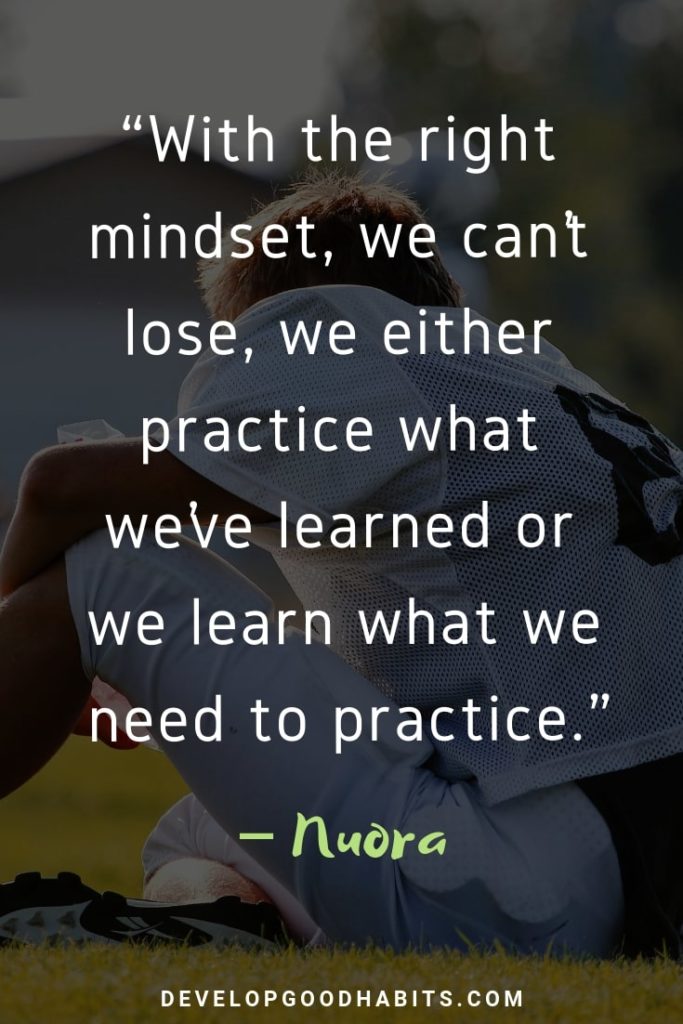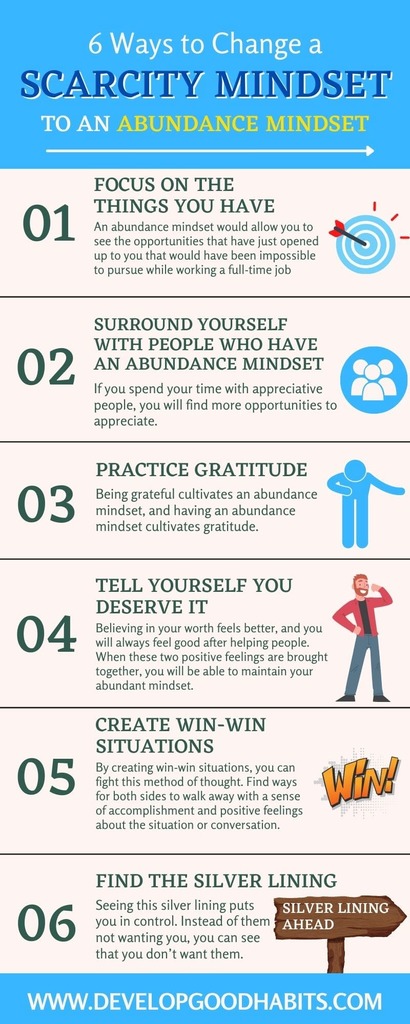Do you remember playing musical chairs as a child?
As the music played and you marched around the circumference of the circle of chairs, you anxiously awaited the music to stop so you could fight for that last seated spot.
I personally strongly disliked this game. There was something about that one-on-one physical competition and face-to-face conflict fighting for something tangible that didn’t sit well with me.
But this is often one of the youngest experiences that we have of a scarcity mentality that can be translated to adult life.
Once you enter that professional world, that “every man for himself” way of thinking often re-emerges as many people fight for a single job opening or a chance at being promoted.
People in the corporate world are conditioned to think in this limiting way, and you may have been influenced as well.
In this article, we are going to talk about what a scarcity mindset is and why you may want to work your way out of it.
Then, I will provide you with five actionable strategies you can use to adjust your mentality to see the abundance of possibilities that are available for everyone.
But first, let’s look more at what a scarcity mindset is.
What Is a Scarcity Mindset?
We have talked about fixed vs. growth mindsets in the past, and you will notice how the idea of scarcity vs. abundance mindsets can relate. Similar to having a fixed mindset, having a scarcity mindset can limit you and prevent you from achieving your goals.
First introduced by Stephen Covey in his book, The 7 Habits of Highly Effective People, the scarcity mindset refers to those who view success as being a finite resource in the world, so the more success your neighbor has, the less there is left for you to claim.
It’s the belief that there will never be enough wealth, success, happiness, or resources to go around, which results in actions that come from a fear that eventually you’ll come up short.
Those with a scarcity mindset will see material things that they want and believe that because they don’t have the money to buy it today, they’ll never be able to get it.
Or, like those with a fixed mindset, they’ll see a job posting that they’re not quite yet a good fit for and assume they would never be able to land such a great position. This results in feelings of jealousy of others.
With a scarcity mindset, people are so focused on keeping the things that they have that they don’t go after new opportunities. They become comfortable living a mediocre life that is safe instead of taking the chance to chase their dreams.
Take a few a minutes to watch teh video below to learn about the similarities between scarcity and fixed mindset.
What Does a Scarcity Mindset Look Like?
This can look like a lot of things.
It could be under-tipping your waiter because you want to keep as much money for yourself as possible, or staying in a middle-management position with a false sense of security so you can just get by in life without taking the chance of risking what you have to go after something that you really want.
People who tend to have this limiting mentality also focus more on what they don’t have than on what they do have.
And, because of this, they’re generally less grateful for their gifts and talents and more fixated on how they compare to the person sitting next to them.
So rather than feeling optimistic about the future, people with a scarcity mindset generally feel negative because they’re so focused on the talents, skills, abilities, and knowledge that they don’t have.
Having a fear of the unknown can make people laser focused on themselves. Just think of what the grocery store shelves look like the day before a big storm is supposed to hit.
You’d be lucky to find milk, bread, water, and other necessities–when, just days before, the shelves were stocked with plenty to go around.
So, what might this look like in a professional setting? Well, it may be a manager withholding information from coworkers in order to maintain some sort of power, or an employee speaking negatively about a colleague in an attempt to look good in front of the boss.
Having a scarcity mindset causes people to make decisions that are only beneficial in the short-term rather than going the extra mile today to reap the benefits tomorrow. It leads to feelings of anxiety as you’re always looking over your shoulder for someone who could possibly take what you have.
So instead of living with this burdensome mindset, let’s talk about the alternative: an abundance mindset.
Why You Should Have an Abundance Mindset
Developing an abundance mindset can have positive effects on your success in your personal life and your professional life.
When you think in terms of abundance, you start to feel capable of achieving your bigger goals in life and you develop the confidence that you need to challenge yourself and push your own limits.
An abundance mentality will also help you cultivate gratitude and develop healthy, positive habits.
In contrast to having a scarcity mindset, think of what it would be like to have a genuine sense of security and feelings of worth. Think about the mental freedom you would experience if you knew that there was plenty of (success, money, recognition, promotions) to go around.
When you adopt an abundance mindset, your fears and anxieties about uncertainty in the future are eliminated. Instead of expecting the worst for the future, you start to gain confidence in all of your resources, spanning from the skills that you have to the money in your bank account.
Plus, studies show that with an abundance mindset and a positive outlook on the future, you’re more likely to live a longer and healthier life.
With an abundance mindset, your focus shifts to the limitless opportunities that you can pursue for positive personal growth and development. Let’s take a look at 6 steps you can take to develop this attitude that will motivate you and help you be more proactive in your life.
6 Ways to Change a Scarcity Mindset to an Abundance Mindset
1. Focus On the Things You Have
Your company goes through a period of downsizing and you’ve just lost your job. You’ve been out of the job market for years now, so you’re left unemployed with an outdated resume and some skills that are getting stale.
With a scarcity mindset, you could consider the competition–those who are fresh out of school and privy to the latest industry trends and technology, and feel defeated as you scroll through job openings.
Or, you could take on an abundance mindset and consider how much time you’ve just been given to get your skills up to speed.
Or, you may think of this as the push you needed to get out of a job that wasn’t your true passion and explore how you want to spend your energy to ensure that you have a fulfilling and satisfying life.
An abundance mindset would allow you to see the opportunities that have just opened up to you that would have been impossible to pursue while working a full-time job.
2. Surround Yourself with People Who Have an Abundance Mindset
We’ve talked about the impact that the people you spend your time with have on your life. If you surround yourself with people who are constantly claiming that life isn't fair–even if you don't agree with that sentiment, they're still going to bring you down.
Attitudes are contagious. So if you're spending your time with people that you don't look up to or aspire to learn from, you're wasting your time with the wrong group of friends.
Alternatively, if you spend your time with appreciative people, you will find more opportunities to appreciate. And when you're surrounded with those who believe there is enough to go around, you probably won't run off from the group to be first in line at the buffet.
If you can relate to people who have an abundance mindset, they will set an example in everyday situations that will allow you to see how this mentality plays out and how it ends up benefiting everyone.
3. Practice Gratitude
It’s really hard to feel anxious or sad while you’re focusing on the positive things in your life.
While it's not a new concept, the process of expressing gratitude has been extensively researched in recent years, and has become a largely recognized and practiced method for improving people's lives— both mentally and physically.
Having an abundance mindset revolves around looking for ways that you can practice gratitude and making the choice to recognize all of the good things in your life. If you can do this, you will automatically escape from a scarcity mindset.

Start by writing down five things every day that you're grateful for. It doesn't matter how small it is, if it adds value to your life, it counts.
And learning to be thankful for the little things will only expand the overall sense of gratitude that you feel. Don't take anything for granted when you're making your list–not even the teaspoon of sugar stirred into your coffee this morning.
And, the great thing is, being grateful cultivates an abundance mindset, and having an abundance mindset cultivates gratitude.
They work together to strengthen each other and fortify their roles in your life. When you practice gratitude, you will notice more and more gifts in your life, and when you can recognize these positive things, you will feel a sense of abundance.
Look at how many list items you've come up with after just a few days. It will be nearly impossible to deny the abundance of positive things you have supporting you in your life.
4. Tell Yourself You Deserve it
Often, people don't think they deserve the good things in life.
This could be because you don't think you're smart enough or talented enough to earn the things you want, or it could be because you see other people suffering and question why you deserve to have things that other people can't enjoy as well.
This lack of self-worth can hold you back from going after the things that will help you lead a fulfilling life.
Convincing yourself that you deserve the things you want in life is certainly easier said than done. But, start by exploring your feelings of why you don't think you deserve things. Could it be imposter syndrome or a sense of guilt? Get to the root of the feelings so you can address them.
With a scarcity mentality, it's easy to believe that you’re not educated enough or you don’t have the right skillset to get the job that you really want.
It’s easy to think you should settle for a lower salary than you actually deserve. And it’s easy to consider your wildest dreams to be just that– an imaginary and “wishful thinking” scenario.
But when you shift your beliefs to understand that you’re worthy of the things that you want, you’re starting to think in terms of abundance. And the truth is, just like everyone else in the world, you deserve to take every last chance to get what you want.
If you feel a sense of guilt, realize that yes, there will always be people suffering in the world. But you can take action and do your part to create a positive change.
So, you could spend your time feeling guilty and comparing yourself to others because you don’t think you’re any more deserving than the next person, or you could use your resources to make a positive impact on others.
Believing in your worth feels better, and you will always feel good after helping people. When these two positive feelings are brought together, you will be able to maintain your abundant mindset.
5. Create Win-Win Situations
With a scarcity mindset, you believe that because one person wins, someone else has to lose.
But, by creating win-win situations, you can fight this method of thought. Find ways for both sides to walk away with a sense of accomplishment and positive feelings about the situation or conversation.
You can do this in personal and professional situations. This could mean practicing mindful listening by listening to someone’s thoughts without passing any judgment or providing them with censorship.
By understanding what a winning situation would look like for both of you, you could brainstorm some solutions until you come up with something that satisfies everyone.
6. Find the Silver Lining
Instead of allowing limiting thoughts to control your mentality and your attitude (such as, “Why do bad things happen to me?”) change that question to, “What’s in it for me?”
Let’s look at this shift of mentality when applied to an issue I’m sure we have all faced at some point. Think back to a time when you opened a gift and thought, “…what?” I can recall this happening to me in several instances when I was given jewelry.
Jewelry is a reasonably personal gift, so someone who gives it to you probably knows you pretty well. That said, I have wondered many times if the gifter of jewelry “had ever met me?!?!”
Well, that was my first thought, which comes from a place of scarcity. Wondering why someone has done this to me when they should know I would never wear that.
To change this mentality to one of abundance, you need to find the silver lining and focus on the positive. In this case, the person giving the gift thought of you on a special occasion and went out of their way to spend their time and money picking out something that they thought you would appreciate.
There is an exhausting amount of psychology behind the process of giving a gift, and none of it mentions a gift-giver trying to annoy the recipient. With this in mind, you can alter your receipt of the message to match how it was intended to be understood.
Now let’s consider what this could look like in the corporate world. You go to an interview and you leave feeling completely defeated because it was a disaster.
You consider that you may never get hired because you’re not what employers are looking for. It would certainly be hard to get a job with this scarcity mindset.
But flip this around to, “Wow, I’m glad I went to that interview. That company is not a good fit for me. I’ll stop wasting my time and cross them off my list.”
Seeing this silver lining puts you in control. Instead of them not wanting you, you can see that you don’t want them.
Final Thoughts on Scarcity Mindset
Having an abundance mindset starts with having a genuine sense of your own inherent worth.
When you believe that you deserve to have what you want and there’s plenty to go around, having an abundance mindset will open up more opportunities and possibilities for you to make an impact on your life and the lives of others.
Follow the tips laid out in this article to identify where in your life you have a scarcity mindset and consider how you can change your thoughts to be more abundant. Doing so will allow you to live a happier and more fulfilling existence.
And if you're looking for more resources to help you break free from scarcity mindset, be sure to check out these articles:
- 15 Fixed Mindset Examples That Limit Your Success
- Is Competition Healthy or Unhealthy? 7 Important Lessons
- 9 Ways to Develop a Wealthy Mindset for Your Future
Finally, if you want to take your goal-setting efforts to the next level, check out this FREE printable worksheet and a step-by-step process that will help you set effective SMART goals.

Connie Mathers is a professional editor and freelance writer. She holds a Bachelor's Degree in Marketing and a Master’s Degree in Social Work. When she is not writing, Connie is either spending time with her daughter and two dogs, running, or working at her full-time job as a social worker in Richmond, VA.




